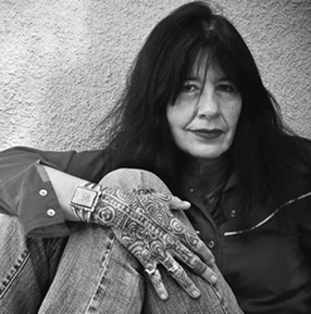 |
| Photo credit: Karen Kuehn |
Hooray for our new Poet Laureate, Joy Harjo, a registered member of the Mvskoke Creek Nation! She is our first Native American Poet Laureate, and now non-Native U.S. citizens have an excellent opportunity for learning.
At this past weekend's Building Cultural Competency symposium at the Highlights Foundation (my brief post about that here), one of the speakers we were most excited to hear was Dr. Debbie Reese, a registered member of the Nambe Pueblo Nation. And, no surprise, she's also very excited that we have a Mvskoke Poet Laureate!
Here's one of my big take-aways from Debbie's talk -- what we casually call "tribes" are actually Sovereign Native Nations, and we should name the nation to which a Native person belongs, rather than generically say Native American. There were thousands of these nations, each distinct in language, location, religion, story, systems of writing, and governance. (Note to self, when I am teaching my fifth graders about forms of government, I need to move beyond Democracy, Monarchy and Dictatorship and include Native governance.) Understanding that Native people belong to sovereign nations is important because the treaties of the past were made between heads of state. (Some references Debbie suggest we explore are Nation to Nation at the Smithsonian, the National Congress of American Indians, and the young people's version of An Indigenous Peoples' History of the United States, which Debbie revised from Roxanne Dunbar-Ortiz's adult version, along with Jean Mendoza, and which is set for publication at the end of July.)
One of my favorite poems by Harjo (so far...I'm just digging in...) is For Calling the Spirit Back from Wandering the Earth in Its Human Feet. It begins
Put down that bag of potato chips, that white bread, that bottle
of pop.
Turn off that cellphone, computer, and remote control.
Open the door, then close it behind you.
Take a breath offered by friendly winds. They travel the earth
Turn off that cellphone, computer, and remote control.
Open the door, then close it behind you.
Take a breath offered by friendly winds. They travel the earth
gathering essences of plants to clean.
Give it back with gratitude.
If you sing it will give your spirit lift to fly to the stars’ ears and
Give it back with gratitude.
If you sing it will give your spirit lift to fly to the stars’ ears and
back.
Acknowledge this earth who has cared for you since you were a
Acknowledge this earth who has cared for you since you were a
dream planting itself precisely within your parents’ desire.
Here's some bonus music that celebrates Native culture and language. The first is an adaptation of the Beetles' "Blackbird" sung in Mi'kmaq, an Algonquian language spoken by the Mi'kmaq, the indigenous people of Nova Scotia. This was produced for the 2019 United Nations International Year of Indigenous Languages. Here's a CBC post about this production, and a WBUR radio spot featuring Emma Stevens.
Why stop there? Here are 11 Pop Songs in Indigenous Languages You Need to Listen To, mostly from Latin America, but also Australia and New Zealand. And here's a Peruvian teenager who is trying to save the Quechua language through music. Okay. Enough with the rabbit holes.
I'm sure (I HOPE) there will be lots of posts about our new Poet Laureate in the Poetry Friday roundup this week. I look forward to learning from and with you! Linda has this week's roundup at A Word Edgewise.

